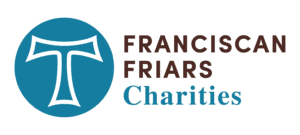
In 1990, the Franciscan friars took responsibility for St. Patrick-St. Anthony Church in Hartford, Connecticut. It was a struggling parish with roots in the previous century’s immigrant Irish and Italian communities.
It was, noted Fr. Mike Johnson, OFM, “a community whose numbers had dwindled and whose spirit needed renewal.” The friars set out to reinvigorate the parish through a sustained outreach to the city’s new immigrant and other struggling communities, via the Franciscan Center for Urban Ministry.
The Center has become a hub of outreach, a model of what dedication to those on the margins can do to renew a parish community.
Fr. Mike, the Center’s current director, recently presented an extensive history of the ministry to the organization’s board. In it, he described how the friars of the 1990s faced what was then the country’s largest health crisis, the HIV/AIDS epidemic.
The friars and their lay helpers began a ministry to the HIV/AIDS community at a time of rampant fear and stigma. “It was a profound declaration that this was a church where all would be truly welcomed, embraced and valued,” noted Fr. Mike.
It was a vision attractive to many, and the parish began to grow. Today St. Patrick-St. Anthony is a spiritual home for people from more than 100 zip codes throughout the Hartford area.
Out of the HIV/AIDS ministry, the Franciscan Center for Urban Ministry was born.
One of its first outreach ministries was devoted to food insecurity, beginning humbly through the work of a single friar who sat by the door for an hour each day to ensure that no one in the community went hungry.
That simple act of compassion blossomed into an effort involving hundreds of parishioners. Today the ministry serves nearly 4,000 meals a month. Parishioners prepare and serve sandwiches and baked goods, and teams serve hot meals twice weekly, as well as delivering meals to the city’s no-freeze shelters during the winter.

The food security ministry has partnered with the University of St. Joseph School of Nursing. Each week, student nurses provide wellness checks on those who come for dinner. This year the program was expanded to include physician assistants.
Another partnership has evolved with the House of Bread, a non-profit working with the poor and marginalized. The House of Bread sponsors a soup kitchen that provides breakfast and lunch, while the Franciscan Center provides dinner.
A housing ministry serves as a place of refuge. Based in the former Sisters of Mercy convent on the parish grounds, it has served as a home for women, Puerto Rican refugees from Hurricane Maria, and as transitional housing for men. Creating buildings for the poor is an ongoing concern of the parish. Five parishioners joined with other Franciscan churches to build five schools in Oaxaca, Mexico.
The Center has also successfully worked for social justice, including support for the Greater Hartford Interfaith Action Alliance (GHIAA) initiatives, including more state funding for programs to decrease gun violence; equity in school funding; health care coverage for undocumented children, environmental cleanup, and an end to welfare liens. GHIAA successfully lobbied for passage of Clean Slate legislation for those who had committed misdemeanors and lesser felonies, allowing those with clean records over 10 years to wipe their records clean, allowing access to jobs and housing.
“It is doing restorative justice. It is what mercy looks like,” noted Fr. Mike.
Fr. Mike notes that the work of charity and justice extends to the Center’s lay supporters. “Our Franciscan commitment to service is not limited to the professed; it includes lay members who live out this charism daily,” he wrote.
He notes that the parish’s spirit is renewed through the Eucharist.
“The beauty of our liturgies is central to our community and spiritual life,” he noted. “The liturgies are a blend of rich tradition, vibrant music, and profound ritual, all designed to uplift the spirit and open the heart. Through sacred music, engaging preaching, and reverent participation in the sacraments, our liturgies invite all who attend to experience the presence of God in a deeply personal and communal way.”
According to Fr. Mike, the spiritual richness of the liturgy is carried far beyond the church’s walls.
“Our open hearts lead to open minds and open doors, making our liturgical celebrations not just moments of worship, but encounters with the divine that resonate long after the service has ended.”

